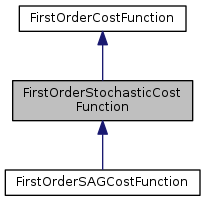|
SHOGUN
4.1.0
|
|
SHOGUN
4.1.0
|
The first order stochastic cost function base class.
The class gives the interface used in first order stochastic minimizers
The cost function must be Written as a finite sample-specific sum of cost. For example, least squares cost function,
\[ f(w)=\frac{ \sum_i{ (y_i-w^T x_i)^2 } }{2} \]
where \((y_i,x_i)\) is the i-th sample, \(y_i\) is the label and \(x_i\) is the features
Definition at line 50 of file FirstOrderStochasticCostFunction.h.

Public Member Functions | |
| virtual void | begin_sample ()=0 |
| virtual bool | next_sample ()=0 |
| virtual SGVector< float64_t > | get_gradient ()=0 |
| virtual float64_t | get_cost ()=0 |
| virtual SGVector< float64_t > | obtain_variable_reference ()=0 |
|
pure virtual |
Initialize to generate a sample sequence
|
pure virtual |
Get the cost given current target variables
For least squares, that is the value of \(f(w)\).
Implements FirstOrderCostFunction.
Implemented in FirstOrderSAGCostFunction.
Get the SAMPLE gradient value wrt target variables
WARNING This method does return \( \frac{\partial f_i(w) }{\partial w} \), instead of \(\sum_i{ \frac{\partial f_i(w) }{\partial w} }\)
For least squares cost function, that is the value of \(\frac{\partial f_i(w) }{\partial w}\) given \(w\) is known where the index \(i\) is obtained by next_sample()
Implements FirstOrderCostFunction.
Implemented in FirstOrderSAGCostFunction.
|
pure virtual |
Get next sample
Obtain a reference of target variables Minimizers will modify target variables in place.
This method will be called by FirstOrderMinimizer::minimize()
For least squares, that is \(w\)